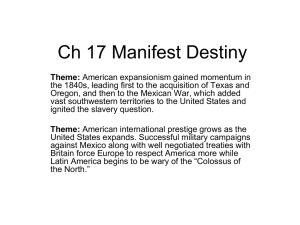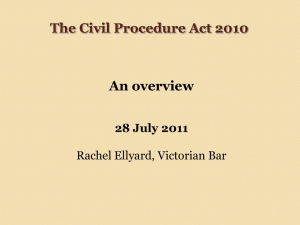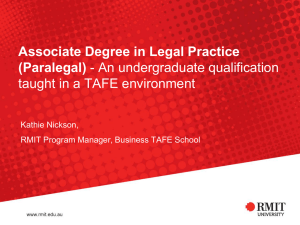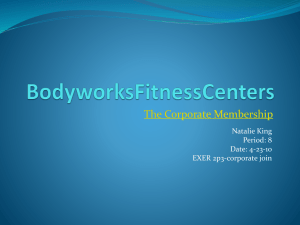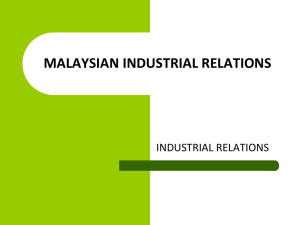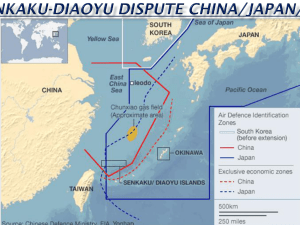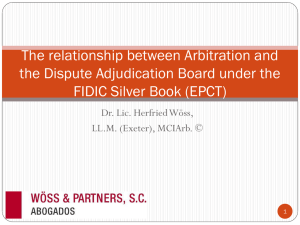know-your-rights-presentation
advertisement
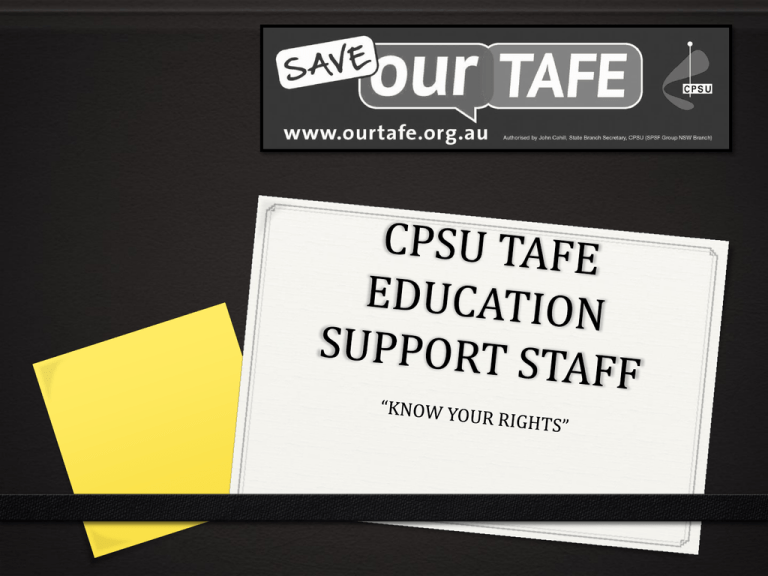
Outline of Program Introduction and acknowledgement of country 5 mins Relational question: what’s been on top of your mind lately? 10 mins Main content 30 mins 1. 2. 3. • • • • • • What interest in particular do you have? Restructures and consultation Leave? Disciplinary action and work performance Union rights Dispute resolution 4. Wrap up • Summary • Troubleshooting and problem solving • Next steps Welcome and acknowledgement of country The CPSU wishes to acknowledge the traditional owners of the land on which we’re meeting. We pay our genuine respects to owners past and present. Introduction 0 This session will explore some of the most important, and commonly used, clauses of your Enterprise Agreement in some detail. 0 We’ll start with some discussion about restructures and consultation. Then we’ll move on to talk about leave issues. After that we’ll talk about disciplinary action, work performance and union rights. Finally, we’ll finish with a discussion about the process of resolving disputes. 0 The session has been left broad and applicable to all education support staff. Relational question 0 Find someone in the room you don’t know well, or don’t normally work with 0 Discuss the question: “What’s been on top of your mind lately?” 0 Can be work or non-work related Know Your Rights Question: What interest in particular do you have in this session? Restructures and consultation Clause 8, TAFE Commission of NSW Administrative, Support and Related Employees Enterprise Agreement 2012 8.1 Employer to notify 8.1.1 Where the Employer has made a definite decision to introduce major changes in production, program, organisation, structure or technology that are likely to have significant effects on employees, the employer must notify the employees who may be affected by the proposed changes and their representative or representatives, if any. 8.1.2 Significant effects include termination of employment; major changes in the composition, operation or size of the employer’s workforce or in the skills required; the elimination or diminution of job opportunities, promotion opportunities or job tenure; the alteration of hours of work; the need for retraining or transfer of employees to other work or locations; and the restructuring of jobs. Provided that where this award makes provision for alteration of any of these matters an alteration is deemed not to have significant effect. Duty to Discuss Change 8.2 Employer to discuss change 8.2.1 The Employer must discuss with the Employees affected and their representatives, if any, the introduction of the changes referred to in clause 8.1, the effects the changes are likely to have on Employees and measures to avert or mitigate the adverse effects of such changes on Employees and must give prompt and genuine consideration to matters raised by the Employees and/or their representatives in relation to the changes. 8.2.2 The discussions must commence as early as practicable after a definite decision has been made by the Employer to make the changes referred to in clause 8.1. 8.2.3 For the purposes of such discussion, the Employer must provide in writing to the employees concerned and their representatives, if any, all relevant information about the changes including the nature of the changes proposed, the expected effects of the changes on employees and any other matters likely to affect employees provided that no Employer is required to disclose confidential information the disclosure of which would be contrary to the Employer’s interests. 8.3 Employees affected by workplace change will be managed in accordance with the NSW Government’s Managing Excess Employees Policy, as amended from time to time. Leave 0 There are many clauses in your Agreement which deal with leave. They are mostly found in Section 3 – General Conditions 0 Generally, you cannot be directed to take leave. The exception to this is found in Clause 34, which is specific to Annual Leave and states: 34.2.3 Annual leave should only accumulate to a maximum of 40 working days. Employees who are Seven-day shift workers or who are required to work regularly on weekends and/or public holidays may accrue to a maximum of 50 days. 34.2.4 Should annual leave balances exceed the limits specified in 34.2.3 of this subclause, the Managing Director may direct staff to take annual leave within a reasonable time period and at a time convenient to the NSW TAFE Commission. 34.2.5 An Employee must take their annual leave to reduce all balances below 8 weeks or its hourly equivalent, and the NSW TAFE Commission must cooperate in this process. Leave (continued) You cannot be required to take leave during a period of College closure. If you do not want to take leave whilst your College is closed, TAFE must provide alternative, suitable, duties for you to perform. Disciplinary action and work performance Disciplinary action 9.1 The Guidelines for the Management of Conduct and Performance the NSW TAFE Commission Staff apply to Permanent Employees employed in classifications under this Agreement. 9.2 The Guidelines identified at 9.1 of this clause may be applied on an appropriate basis to permanent employees employed on probation. 9.3 The Guidelines identified at 9.1 of this clause do not apply to Temporary, or Casual Employees. Disciplinary action and work performance Work performance 0 TAFE NSW’s “Guidelines for the Management of Conduct and Performance” are an example of an instrument that covers your employment but is external to your Enterprise Agreement 0 The processes set out in this document must be followed if an allegation of one or more of the following are made against you: 0 Misconduct; 0 Unsatisfactory performance; or 0 A serious criminal offence. 0 Importantly, the guidelines are underpinned by principles of timeliness, procedural fairness and deciding each matter on its merits. Disciplinary action and work performance Work performance 9. Management of Conduct and Performance 9.1 The Guidelines for the Management of Conduct and Performance the NSW TAFE Commission Staff apply to Permanent Employees employed in classifications under this Agreement. 9.2 The Guidelines identified at 9.1 of this clause may be applied on an appropriate basis to permanent employees employed on probation. 9.3 The Guidelines identified at 9.1 of this clause do not apply to Temporary, or Casual Employees. Disciplinary action and work performance Important points to note: 0 If an allegation is made against you under the Guidelines, you should refer to the applicable section(s) of that document and immediately contact your union delegate or representative for advice; 0 Never go into a meeting alone. You have the right to be represented and to have a representative or support person present. Union rights 0 Your enterprise agreement contains a number of clauses relating to rights of union members, delegates and officials 0 These are mainly found in clauses 55-64 0 For example, union delegates have the right to: 0 Represent members at meetings with management; 0 Attend Work Health and Safety Committee meetings; and 0 Distribute union publications or material. Union rights Clause 56: Special leave can be taken by union delegates for: 0 Annual Conference in May or Women’s Conference in September; 0 Meetings, such as Central Council or Women’s Council; 0 Unions NSW Annual Conference/ ACTU Congress Trade union training leave Members can take special leave to attend: 0 Work Health and Safety (WH&S) courses for WH&S Committee members; 0 12 days biannual trade union training leave to participate in the CPSU’s extensive education program – free to members 0 See www.psa.asn.au/training for more information Dispute resolution Dispute Resolution Procedures 6.1 The TAFE Commission and its Employees have an interest in the proper application of this Agreement and in minimising and settling disputes about matters in this Agreement in a timely manner. 6.2 Where a dispute arises in relation to: 6.2.1 a matter under this Agreement; or 6.2.2 the imposition of a penalty of fine, demotion, or dismissal as a result of a disciplinary process under the Guidelines for the Management of Conduct and Performance NSW TAFE Commission Staff; or 6.2.3 the National Employment Standards; it will be dealt with in accordance with the procedures set out in this clause. What are the National Employment Standards? 0 10 minimum conditions under the Fair Work Act 1. Fair Work Information Statement - employers have to give the Fair Work Information Statement to all new employees. 2. Maximum weekly hours of work - 38 hours per week, plus reasonable additional hours. 3. Requests for flexible working arrangements - parents and carers can ask for a change in working arrangements to care for young children under school age or children under 18 with a disability. 4. Parental leave and related entitlements - up to 12 months unpaid leave, the right to ask for an extra 12 months unpaid leave and other types of maternity, paternity and adoption leave. 5. Annual leave - 4 weeks paid leave per year, plus an extra week for some shift workers. 6. Personal / carer’s leave and compassionate leave - 10 days paid personal (sick) / carer’s leave, 2 days unpaid carer’s leave and 2 days compassionate leave (unpaid for casuals) as needed. 7. Community service leave - up to 10 days paid leave for jury service (after 10 days is unpaid) and unpaid leave for voluntary emergency work. 8. Long service leave - entitlements are carried over from pre-modern awards or from state legislation. For details see the Long Service Leave and the National Employment Standards fact sheet. 9. Public holidays - paid days off on public holidays unless it’s reasonable to ask the employee to work. 10. Notice of termination and redundancy pay - up to 4 weeks' notice of termination (5 weeks if the employee is over 45 and has been in the job for at least 2 years) and up to 16 weeks redundancy pay. Dispute resolution procedure 6.3 An Employer or Employee may appoint another person, organisation or union to accompany and/or represent them for the purposes of this clause. 6.4 In the first instance Employee(s) or their appointed representative(s), must notify the appropriate representative of Workplace Management of the dispute in writing (‘the dispute notification’). An appropriate representative of Workplace Management may be the relevant line manager or if the Employee believes the line manager is not appropriate the Employee may request that the matter be referred to another officer. 6.5 The dispute notification must be in writing and include details of the dispute. The dispute notification should also make reference to clause(s) of the Agreement or the National Employment Standard in relation to which the dispute has arisen and indicate the resolution(s) sought. A copy of the dispute notification will be sent to the Human Resources Manager. The Employee(s), Employee representative(s) if one has been appointed, and Workplace Management representative(s) will meet within five working days, unless otherwise agreed, in an effort to resolve the dispute. 6.6 Where after the completion of subclause 6.5 the dispute remains unresolved, the matter may be referred in writing to the next level of management. A meeting must be held within five working days of the dispute being referred in a further effort to resolve the dispute, unless otherwise agreed. Dispute resolution procedure 6.7 Where a dispute is not resolved following the steps in sub-clauses 6.5 and 6.6, the matter may be referred by either party to the dispute to Fair Work Australia for resolution by mediation and/or conciliation and, if necessary arbitration. 6.8 If Fair Work Australia arbitrates the dispute, it may also use the powers that are available to it under the Fair Work Act. 6.9 The parties agree to be bound by and implement any decision of Fair Work Australia subject to either party exercising a right of appeal against the decision of Fair Work Australia to the Full Bench. 6.10 Until the dispute resolution procedures referred to at subclauses 6.1 to 6.9 have been exhausted: 6.10.1 normal work shall continue; 6.10.2 no industrial action shall be taken by a party to the dispute in respect of the matter that is the subject of the dispute; 6.10.3 the parties to the dispute shall not take any other action likely to exacerbate the dispute. Problem solving in your workplace Question: if there is a problem in your workplace which affects you or your colleague(s), what can you do? Problem solving process Sometimes we react too quickly when faced with a problem. Often the first thing we do is to suggest a solution before we have looked at the problem properly. We also need to think about what opportunities the problem provides for organising and building your union: 0 Does the problem affect more than one person? 0 If so, how do others feel about it? Are they willing to take action of some sort? Problem solving process – 3 questions to ask 1. What is wrong? (facts and issues) Get the facts, check you understand them and they are accurate. What do the facts mean to the people involved? How do they interplay with rights and entitlements? Once we have the facts we can identify the issues Problem solving process – 3 questions to ask 2. What can we do? (options) What are the possible options? Be creative! One option may be to do nothing, another may be industrial action – but there are many things in between. For most options there will be many possible lines of action. All should be considered and all should be considered as organising opportunities. Problem solving process – 3 questions to ask 3. What will we do? (action) Deciding on the best option involves using a number of criteria. Which of the options: 0 Is most likely to be successful? 0 Is realistic? 0 Has a role for the worker(s) with the problem? 0 Has the potential to gain the support of other workers? 0 Has the potential to recruit new members to your union? If you’ve tried this and the problem is still there… Speak with your local CPSU delegate (if unsure who this is, go to www.ourtafe.org.au), or your CPSU Organiser. What next for your CPSU in TAFE in 2013? 0 Enterprise Bargaining – round 2 0 “Our TAFE” launch at metropolitan College and most regional Colleges

